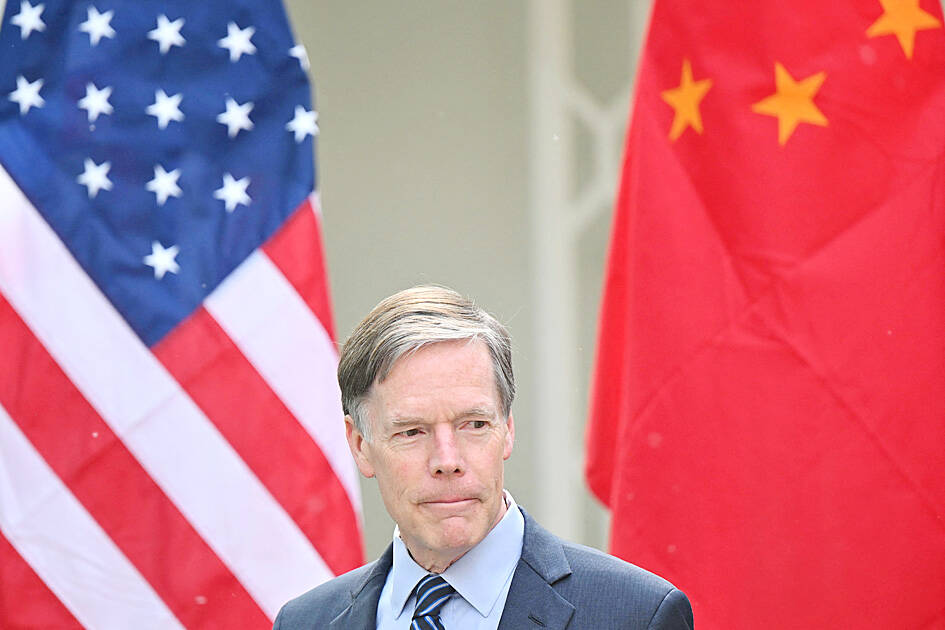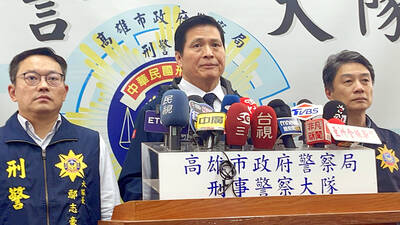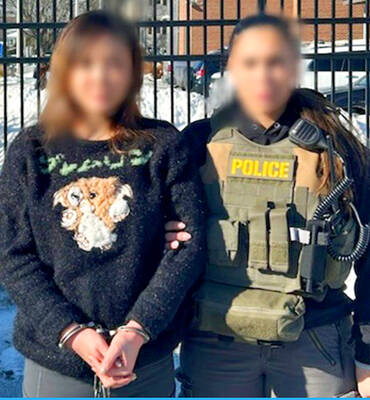Outgoing US Ambassador to China Nicholas Burns said the Chinese government is making a mistake in being so belligerent and intimidating toward Taiwan, and that he believes it would be better for the Chinese government to talk to President William Lai (賴清德).
Burns made the remark in an interview with the Foreign Affairs magazine’s podcast, titled “In the Room With Xi Jinping: A Conversation With Nicholas Burns” released on Thursday last week.
Speaking with Foreign Affairs editor Dan Kurtz-Phelan, Burns, who has served as US ambassador to China since 2022, looks back on the approach of US President Joe Biden’s administration to managing the US’ relationship with China, as the two powers in the past several years butted heads over trade and technology, Russia’s war on Ukraine, and Beijing’s aggression in the South China Sea and the Taiwan Strait.

Photo: AFP
Asked about the Chinese leadership’s intentions toward Taiwan, and how they think about “unification” and their chances, Burns said “there is no question that the Chinese leadership has been very clear about this.”
“They intend to bring Taiwan… what they would say ‘back into the People’s Republic of China,’ but of course the Chinese government has not ruled, from the mainland, Taiwan since 1895,” he said.
“But there is no question that’s the strategic ambition of China. They make that clear every single day, publicly and privately to us,” he added.
“We [the US] have been very consistent with the one-China policy since 1979,” Burns said, adding that the US has also consistently spoken up and told the Chinese government that “they are making a mistake to be so belligerent, and they are making a mistake to try to intimidate Taiwan itself.”
He said therefore the US is exercising its responsibility under the Taiwan Relations Act to provide defensive military technology to Taiwan, and that it has done so in a very vigorous way.
“We also stand up for the principle that these cross-strait differences … have to be resolved peacefully, and we challenge China to do that,” Burns said. “We think that it would be a better step by the government in China to talk to the Taiwan authorities and President Lai, and they refuse to do that.”
Speaking about strengthening the US’ position in the Indo-Pacific, Burns said Japan has been much more outspoken and vigorous on the issue of Taiwan than it had before, as well as the Philippines.
It has also been interesting to see many members of the European parliaments, such as the Bundestag (German federal parliament) and the French National Assembly, flying into Taipei to show political support and humanitarian support for the Taiwanese authorities, he said.
“We’ve obviously got to build up our capacity to deal with any kind of eventuality there … and I think we are in a strong position in arguing to the rest of the world that all of us should insist this problem be resolved peacefully,” Burns said, adding that China refused to do that and asserts that it reserves the right to use force.
He stressed the US has been remarkably consistent on the policy towards Taiwan over the past 45 to 46 years (since the US Taiwan Relations Act was enacted). Every administration and both parties agree on this policy, because it has worked, and they hope it would continue to work in the future, he said.
Asked about his level of concerns about a crisis in the Taiwan Strait, Burns said he admires US Indo-Pacific Commander Admiral Samuel Paparo’s remarks to similar questions, which is “we have to be prepared every day,” and not think about timelines of five, 10 or 15 years from now.
The US is powerful, but that is largely a function of the US’ alliance relationships that multiply its power, especially in the Indo-Pacific, where the US’ treaty allies — Japan, South Korea, the Philippines, Thailand and Australia — have expanded the power of the US, he said.
Many people want to measure who is stronger in the competition between the US and China, including in terms of nuclear weapons, naval power and air force, as well as their economies, but “it’s a false way of measuring power,” because it is China versus the US and all of its allies, Burns said.
“If we are interested in outcompeting the Chinese, as Americans, we must stay close to our allies, not forsaking our allies, not trying to criticize our allies publicly or humiliate them publicly, or contest their own borders and their national sovereignty publicly,” he said.

Twenty-four Republican members of the US House of Representatives yesterday introduced a concurrent resolution calling on the US government to abolish the “one China” policy and restore formal diplomatic relations with Taiwan. Led by US representatives Tom Tiffany and Scott Perry, the resolution calls for not only re-establishing formal relations, but also urges the US Trade Representative to negotiate a free-trade agreement (FTA) with Taiwan and for US officials to advocate for Taiwan’s full membership in the UN and other international organizations. In a news release announcing the resolution, Tiffany, who represents a Wisconsin district, called the “one China” policy “outdated, counterproductive

Actress Barbie Hsu (徐熙媛) has “returned home” to Taiwan, and there are no plans to hold a funeral for the TV star who died in Japan from influenza- induced pneumonia, her family said in a statement Wednesday night. The statement was released after local media outlets reported that Barbie Hsu’s ashes were brought back Taiwan on board a private jet, which arrived at Taipei Songshan Airport around 3 p.m. on Wednesday. To the reporters waiting at the airport, the statement issued by the family read “[we] appreciate friends working in the media for waiting in the cold weather.” “She has safely returned home.

ON PAROLE: The 73-year-old suspect has a criminal record of rape committed when he was serving in the military, as well as robbery and theft, police said The Kaohsiung District Court yesterday approved the detention of a 73-year-old man for allegedly murdering three women. The suspect, surnamed Chang (張), was arrested on Wednesday evening in connection with the death of a 71-year-old woman surnamed Chao (趙). The Kaohsiung City Police Department yesterday also unveiled the identities of two other possible victims in the serial killing case, a 75-year-old woman surnamed Huang (黃), the suspect’s sister-in-law, and a 75-year-old woman surnamed Chang (張), who is not related to the suspect. The case came to light when Chao disappeared after taking the suspect back to his residence on Sunday. Police, upon reviewing CCTV

Johanne Liou (劉喬安), a Taiwanese woman who shot to unwanted fame during the Sunflower movement protests in 2014, was arrested in Boston last month amid US President Donald Trump’s crackdown on illegal immigrants, the Criminal Investigation Bureau (CIB) said yesterday. The arrest of Liou was first made public on the official Web site of US Immigration and Customs Enforcement (ICE) on Tuesday. ICE said Liou was apprehended for overstaying her visa. The Boston Field Office’s Enforcement and Removal Operations (ERO) had arrested Liou, a “fugitive, criminal alien wanted for embezzlement, fraud and drug crimes in Taiwan,” ICE said. Liou was taken into custody